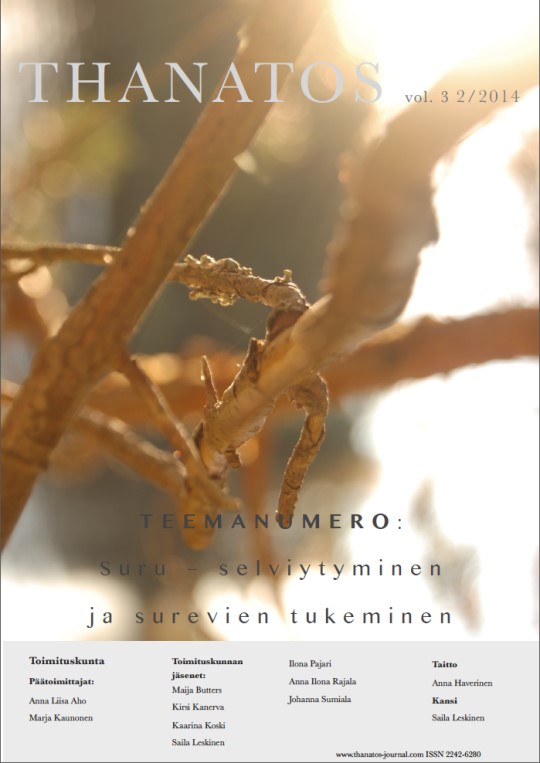Hautaustoimistot surevien tukena – muuttuva surukäsitys ja hautausalan kasvava rooli kuolemanrituaaleissa 1900-luvun loppupuolen Suomessa
Abstract
Abstract: Morticians as providers of support for the bereaved
The role of Finnish morticians has changed decisively in the past one hundred years. In this article, I look at this process from the point of view of helping mourners in their grieving process. The main research source is the Finnish journal of morticians, Tiimalasi [Hourglass], in which professional undertakers share information and various other matters concerning their trade.
Until the middle of the 20th century, Finnish morticians mostly sold and dealt with funeral-related items like coffins and wreaths. Transportation was also traditionally part of their service. However, an urbanising and modernising society created new needs and new tastes, and new ideas about grief and mourning allowed morticians to expand their range of services. Increasingly, the family of the deceased no longer took care of the corpse or contacted the church or other authorities. This was justified by an appeal to the mourners’ state of shock prohibiting them from taking care of such mundane matters. The task of the mortician was to ensure that the family could preserve a positive memory of the last moments they had spent with their loved one.
From the 1970s onwards, this ideology started to evolve into a more psychologically inspired vision of mourners. New information about the therapeutic aspects of mourning became available, and morticians were eager to understand their clients better. Naturally, there were commercial ulterior motives behind this: a better understanding of grief meant better customer relations, which could in turn lead to selling more services, but the morticians’ interest in psychology was also motivated by their own personal needs: their ability to cope in their work was challenged in a more emotionally sensitive mental climate.
Finnish morticians have had an impact on many aspects of Finnish death rituals, a development brought about by their expanding role in funeral arrangements and the diminishing ability of the families of the deceased deal with these. Indeed, their entire existence as a profession has been brought about by a social change in which professionals take care most of the tasks that families and local communities used to manage. Sometimes their interaction with their mourning clients becomes very personal – the coffin-maker of the old days could not and did not need to provide such consolation or such a comprehensive service.
Downloads
Published
Issue
Section
License
Copyright (c) 2023 Ilona Pajari

This work is licensed under a Creative Commons Attribution-NonCommercial-NoDerivatives 4.0 International License.





